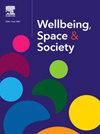探索社区花园和社区厨房对心理健康的影响:范围审查
IF 2.2
Q2 GEOGRAPHY
引用次数: 0
摘要
参与社区花园(cg)过程的参与者经历了许多积极的结果,从社交网络到与自然的亲密关系。然而,在共同创造和共同参与实践与这种协作社会实践对心理健康的影响之间,特别是与结构边缘化人群相关的文献中存在差距。为此,我们的范围综述探讨了已知的cg与心理健康益处之间的关系。Arksey和O 'Malley的范围审查方法被Levac、Colquhoun和O 'Brien强调研究和政策实践意义的方法所使用和补充。22项研究符合纳入标准,分别在美国、加拿大、英国、澳大利亚、新西兰、西班牙、葡萄牙、日本和新加坡进行。大多数研究采用定性或混合方法。本综述中的CGs位于监狱、大学校园、教堂、庇护所、城市屋顶以及城市和农村社区。这些协商小组涉及各种人口,包括移民、难民、新移民、土著人民、妇女、老年人、学生、青年、种族化的人民以及残疾人和有精神健康问题的人。我们的研究结果表明,CG参与者的心理健康与参与过程密不可分,比如协作式的场所制作劳动,从而产生社会联系、协作学习、赋权和与自然的联系。我们指出这种共同创造和共同参与的进程与类似的基于土地和/或地方的做法之间的联系,着眼于公民参与和/或人权意识的潜力,以促进精神健康公平。本文章由计算机程序翻译,如有差异,请以英文原文为准。
Exploring the impact of community gardens and community kitchens on mental health: a scoping review
Participants engaged in community gardens (CGs) processes experience many positive outcomes, from social networking to intimacy with nature. Yet there exists a gap in the literature on CGs between their co-creative and co-participative practices and the impact of such collaborative social practices on mental health, especially as it relates to structurally marginalized populations. To this end, our scoping review explores what is known about the relationship between CGs and mental health benefits. Arksey and O’Malley’s scoping review method was used and supplemented by Levac, Colquhoun, and O’Brien’s emphasis on research and policy practice implications. Twenty-two studies met the inclusion criteria and they were conducted in the United States, Canada, the United Kingdom, Australia, New Zealand, Spain, Portugal, Japan, and Singapore. Most of the studies used qualitative or mixed methods. The CGs in this review were situated in prisons, university campuses, a church, a shelter, urban rooftops, and urban and rural neighbourhoods. These CGs engaged diverse populations, including immigrants, refugees, newcomers, Indigenous peoples, women, seniors, students, youth, racialized peoples, and persons with disabilities and mental health issues. Our results reveal that the mental health of CG participants is inseparable from engagement processes like collaborative place-making labour that engender social connectedness, collaborative learning, empowerment, and a connection to nature. We gesture to the affinities between this co-creative and co-participative process and similar land and/or place-based practices with an eye to the potential for civic participation and/or awareness of human rights to advance mental health equity.
求助全文
通过发布文献求助,成功后即可免费获取论文全文。
去求助
来源期刊

Wellbeing Space and Society
Social Sciences-Social Sciences (miscellaneous)
CiteScore
2.70
自引率
0.00%
发文量
46
审稿时长
124 days
 求助内容:
求助内容: 应助结果提醒方式:
应助结果提醒方式:


